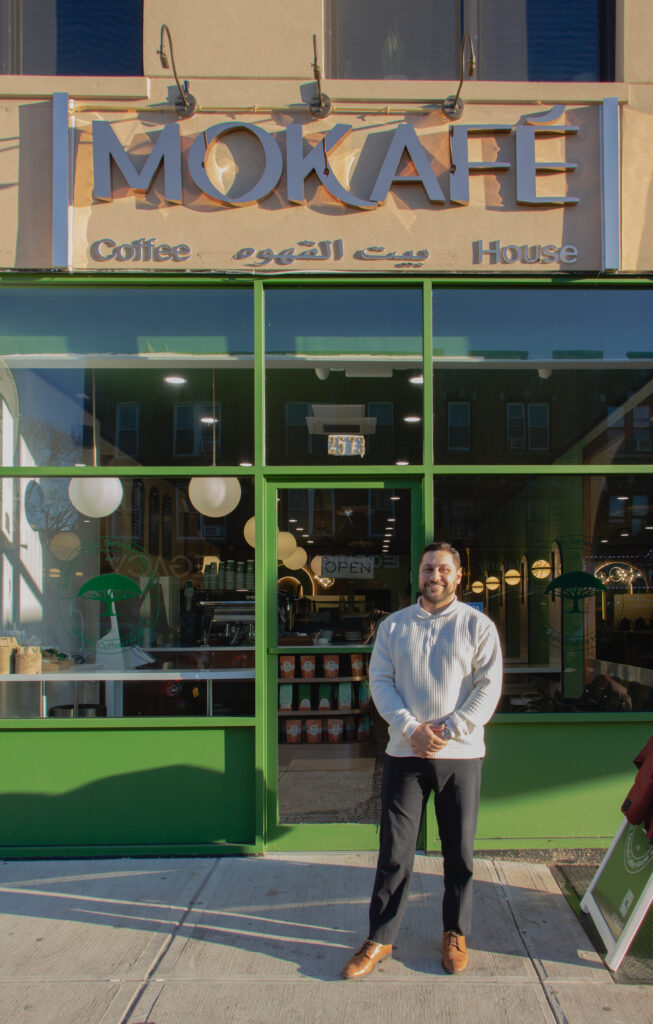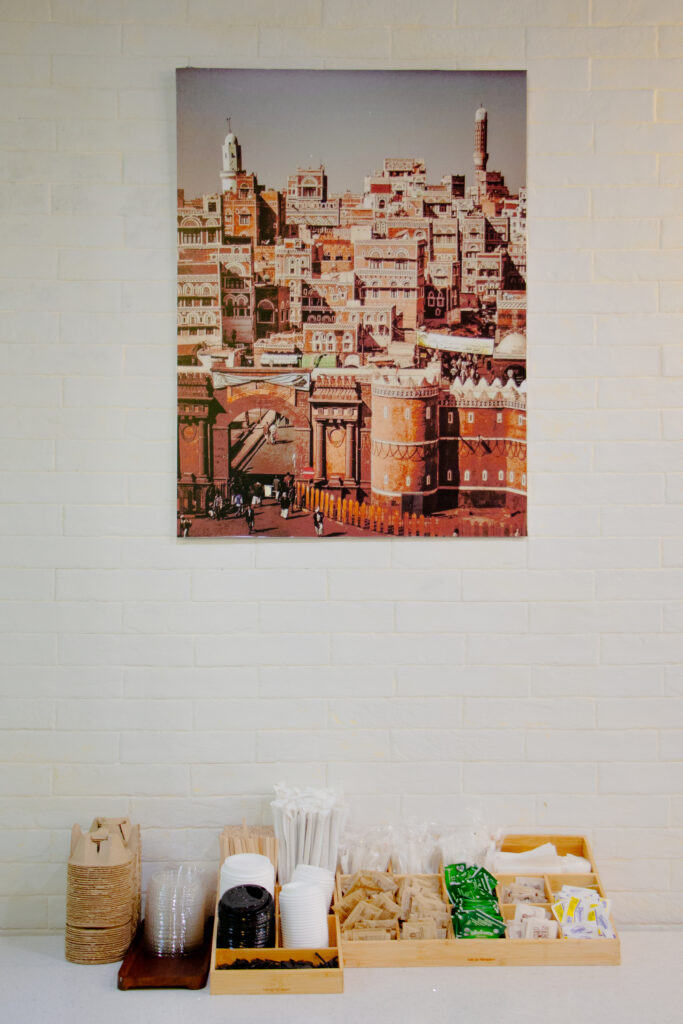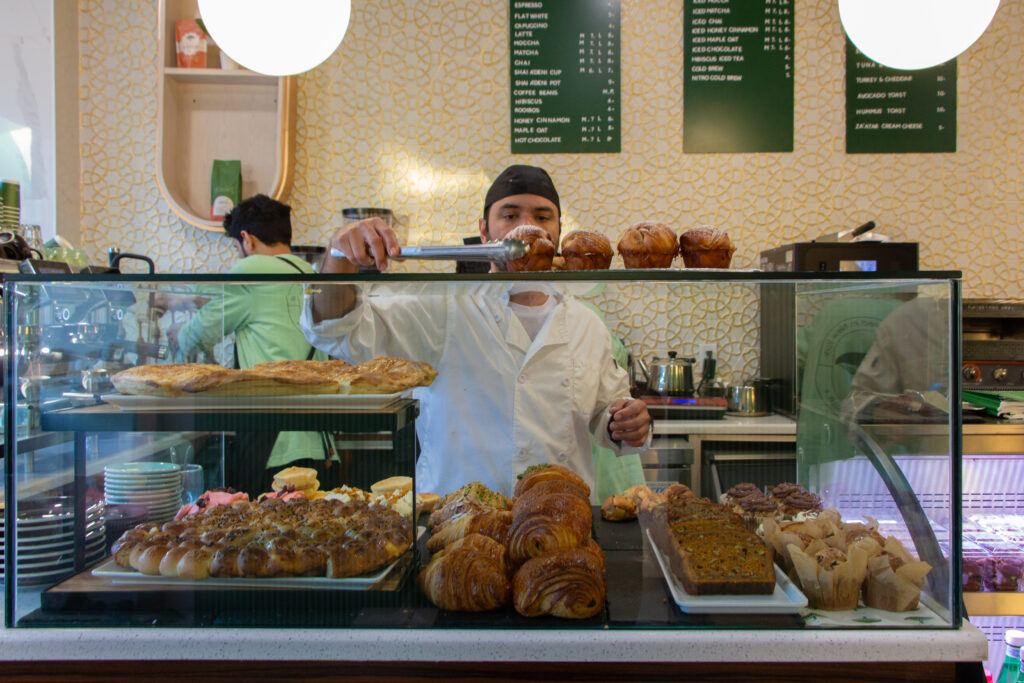
Youssef Mubarez at Mokafé. Credit: Daleelah Saleh
by Daleelah Saleh | news@queensledger.com
On November 17th, Mokafé Coffee House, located at 25-73 Steinway Street, opened its doors to the public. It has been a bustling community hub ever since, with Arabs coming in for a taste of their homeland, and non-Arabs arriving to try out new flavor profiles.
Upon first glance, Mokafé appears like many other modern coffee houses: sleek with an upscale design. But every aspect of the space is intentionally “rooted in origin,” which is a core part of their mission statement. The backsplash behind the kitchen area consists of white and gold Islamic-style star tiling. Interspersed on the walls are photos of Yemen, as well as images of the Guatemalan and Yemeni coffee farmers that harvest the beans roasted in the café. Also on the wall and in the cafe’s logo is the umbrella-shaped dragon blood tree, the national tree of Yemen native to the island of Socotra. As an homage to the iconic baseball stadiums of New York, there is bleacher-style seating by the door.
Even the name Mokafé is a reference to the Yemeni port city of Mokha. Often called the “Birthplace of the Coffee Trade,” this city was also the namesake of the popular chocolatey coffee drink.
For the Mubarez family, which founded Mokafé together, New York is as much a part of their DNA as Yemen. After immigrating to the United States in the 70s, co-founder Youssef Mubarez’s parents raised him and his siblings in Astoria, just a few blocks away from where Mokafé now sits.
According to Youssef, his family was very integrated into the Arab community on Steinway street, making it a no-brainer to have their flagship location there. He expressed gratitude for the support they have received from fellow business owners, who asked about the café before it even opened, gave advice and helped spread the word of its opening. Through a combination of word of mouth and their Instagram account (@mokafe_coffeehouse), Mokafé has already become a staple on Steinway.

Every aspect of the space is intentionally “rooted in origin.”
Credit: Daleelah Saleh
Come by late at night and you might be surprised to find almost every table full. It makes perfect sense though. If you want to meet a friend after 8 p.m. but don’t want to foot a $20-plus restaurant bill and don’t want to go to a bar or hookah lounge, your options have historically been limited. Mokafé solves that problem. For less than $4, you can get a drink or pastry and socialize for hours.
One recent Google review under the name Dylan Hirsh wrote, “East Astoria has sorely needed a decent coffee shop. This one is delicious, laptop friendly, bright, and open late. It’s such a win for the neighborhood.” Similarly, another review written by Steven DiDonato remarked “this place filled a hole I didn’t even realize was there.”
Being open late isn’t the only void that Mokafé fills. In light of the humanitarian crisis in Palestine, there have been widespread calls for boycotts of franchises like Starbucks – which has multiple locations in Astoria, including one on Steinway. Mokafé offers a local alternative at a time when many are eager to support small businesses, especially Arab/Muslim-owned ventures.
Youssef noted that “with Islamophobia [and anti-Arab sentiments] on the rise, people want to feel comfortable in their spaces. Since opening, [Mokafé] has become a hub for everybody but especially Muslims and Arabs to hang out, feel safe, and eat or drink something they might be used to at home.”
Beyond these cultural aspects, Youssef asserts that the quality of their coffee and their ethical approach to coffee production helps Mokafe stand out. In a culture where our consumption of food and drink is so far removed from its origins, the Mubarez family puts names and faces to every aspect of Mokafé.
“A lot of big companies get their beans from Yemen but kind of hide the fact. We’re saying not only is it from Yemen, here’s a photo of the Yemeni farmer that grew them. The same for Guatemala – people usually think beans come from Colombia.”
The two countries have a shared history of exploitation, and the Mubarez family is looking to counter that.
“It’s important to us that instead of just saying ‘this is where [our coffee] is from’ as a means of commercialization, we’re actually creating a sense of appreciation for the farmers that grow our beans and the land they grow on.”
They believe in a “farm to cup” model that has been a long time in the making. The idea for Mokafé first came about in early 2022, when Jorgé Ciciliani was introduced to Youssef and his father, Abdul, through another business partner, Luis Booth. A Guatemalan coffee scientist, Ciciliani has worked in the coffee industry for over a decade and has racked up accolades at various coffee competitions. He initially proposed that he team up with the Mubarez family to sell high-quality Guatemalan and Yemeni coffee beans wholesale.
The Mokafé Coffee Lab on Vernon Boulevard was opened as a space to test out different beans, package them, and provide training for employees. After a while, they came to the conclusion that “if we’re gonna invest this much in getting the right beans and recipes for coffee, why not open a coffee shop to exponentially boost it and create an experience for people who drink it.” They started searching for places in Astoria and found their dream location on Steinway.
But one location wasn’t enough. Abe Ayesh, a Palestinian who has also worked with Mubarez on other business projects, insisted on also bringing Mokafé to Paterson, New Jersey – another major hub for the Arab and Muslim communities. The Paterson and Astoria stores ended up opening within a two-week period in November, which Youssef described as “intense but rewarding.”
Although it’s only been a little over a month since opening their storefronts, the Mubarez family and the Mokafé team already have big plans for the future. They’d like to open a backyard area for the Astoria location to offer more seating for customers. Thinking ahead to Ramadan, which will fall between March and April, they’re aiming to further extend their store hours to provide food and drink for the Muslim community after they break their fast at night. They’re already exploring places in other parts of New York to open more cafés and having conversations with people from different states to bring the Mokafé experience to as many people as possible. While they’re currently working under a partnership model, Youssef is looking forward to hopefully moving to an operator model and franchising the business.
Ultimately, he’d like to bring Mokafé back to the roots of Yemeni entrepreneurship in America: the corner deli.
It’s estimated that Yemeni-Americans own 4,000-6,000 of the roughly 10,000 bodegas in New York City. Youssef estimates that his father Abdul, a prominent businessman and community leader, used to sell between two and three thousand cups of coffee a day at the handful of corner delis that he owned. He envisions a different future for the deli coffee, noting that most of the time, people are just trying to get some cheap caffeine on their way to work and will settle for whatever’s nearby. Youssef would like the Mokafé team to sell their higher quality Yemeni and Guatemalan beans to delis so they can brew a cup of coffee that “makes customers want to come back again and again.”
Credit: Daleelah SalehIn the meanwhile, Queens residents can get their Mokafé fix at the Astoria location, which is open from 8 a.m. to 11 p.m. every day.
You can place orders online or by calling them at (646) 235-8924. And if you’re looking for beans to roast at home, you can purchase bags in-store or on their website, where you can also find a myriad of blog posts with recipes, guides, and even some coffee history.
If you’re visiting Mokafé for the first time, and craving your normal cup of joe, they have all the classics: latte, espresso, drip, etc. “You can get whatever you like however you like it. We want people to come order their normal coffee but think this one tastes way better.” If you want to try something new, Youssef recommends getting the Adeni chai, a Yemeni black tea with cardamom and milk, and Sabayah, a layered honey cake. The Sabayah is made by his mom in her kitchen a few doors down, using a recipe that she has perfected after years of making it for friends and family. “Order those two, sit for however long you want and enjoy it,” Youssef said.






